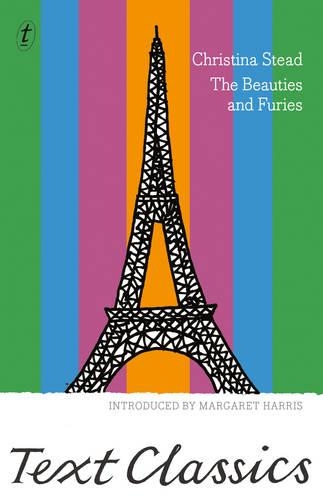
The Beauties and Furies
(Paperback)
Publishing Details
The Beauties and Furies
By (Author) Christina Stead
Introduction by Margaret Harris
Text Publishing
The Text Publishing Company
3rd October 2016
Australia
Classifications
General
Fiction
FIC
Physical Properties
Paperback
512
Width 128mm, Height 198mm
Description
'The express flew towards Paris over the flooded March swamps. In a parlour-car, the melancholy dark young woman looked out persistently at the sand-dunes, cement-mills, pines, the war-cemetery with stone banners like folded umbrellas, the fields under water, the bristling ponds with deserted boats and the little naked trees which marked the horizon-searching roads.' It is 1934, and Elvira Western has left London and her dull marriage to Paul, a doctor, for Paris and her waiting lover, Oliver, a student radical. But drab hotels and interminable discussions of politics are not her idea of romance, and soon Elvira is wishing she could leave the city of 'many beauties-and furies', and return home...Christina Stead's second novel dramatises a love triangle against a backdrop of political upheaval. Its publication in 1936 prompted a writer for the New Yorker to call Stead the 'most extraordinary woman novelist' since Virginia Woolf.
Reviews
'Stead is of that category of fiction writer who restores to us the entire world, in its infinite complexity and inexorable bitterness, and never asks if the reader wishes to be so furiously enlightened and instructed, but takes it for granted that this is the function of fiction.' -- Angela Carter London Review of Books 'I cannot see how anyone can deny Miss Stead's position as the most extraordinary woman novelist produced by the English-speaking race since Virginia Woolf.' New Yorker 'It's not easy to explain how much pleasure there was in reading Christina Stead's second novel The Beauties and Furies...It is such a dynamic novel, rich with wonderfully complex characters and a compelling storyline...The Beauties and Furies is a brilliant novel.' ANZ Lit Lovers 'Stead paints an enticing, kinetic picture of Parisian cafe life and rented lodgings, friendly prostitutes and dissipated journalists, a sort of update of A Moveable Feast spiced with the rising threat of fascism. She also shows the influence, as the helpful introduction notes, of Joyce's Ulysses, with a resourceful lexicon of wordplay, stream of consciousness and bravura passages that stand out from her conventional prose the way Marpurgo's evil overshadows the small sins of adultery. A welcome reissue of an intriguing, atmospherically rich work.' Kirkus Reviews, starred review
Author Bio
Christina Stead was born in 1902 in Sydney's south. After graduating from high school in 1917, she attended Sydney Teachers' College on a scholarship. She subsequently took a series of teaching and secretarial positions before travelling to London, aged twenty-six. There she met Wilhelm Blech (later William Blake), a married American writer and a broker at the firm where she worked: they soon became lovers. They spent many years travelling and working in Europe and the United States, and eventually married in 1952. Stead's first books, The Salzburg Tales and Seven Poor Men of Sydney, were published in 1934 to positive reviews in England and the United States. Her fourth work, The Man Who Loved Children, has been hailed as a 'masterpiece' by Jonathan Franzen, among others. In total, Stead wrote almost twenty novels and short-story collections. Stead returned to Australia in 1969 after forty years abroad for a fellowship at the Australian National University. She resettled permanently in Australia in 1974 and was the first recipient of the Patrick White Award that year. Christina Stead died in Sydney in 1983, aged eighty. She is widely considered to be one of the most influential Australian authors of the twentieth century.
